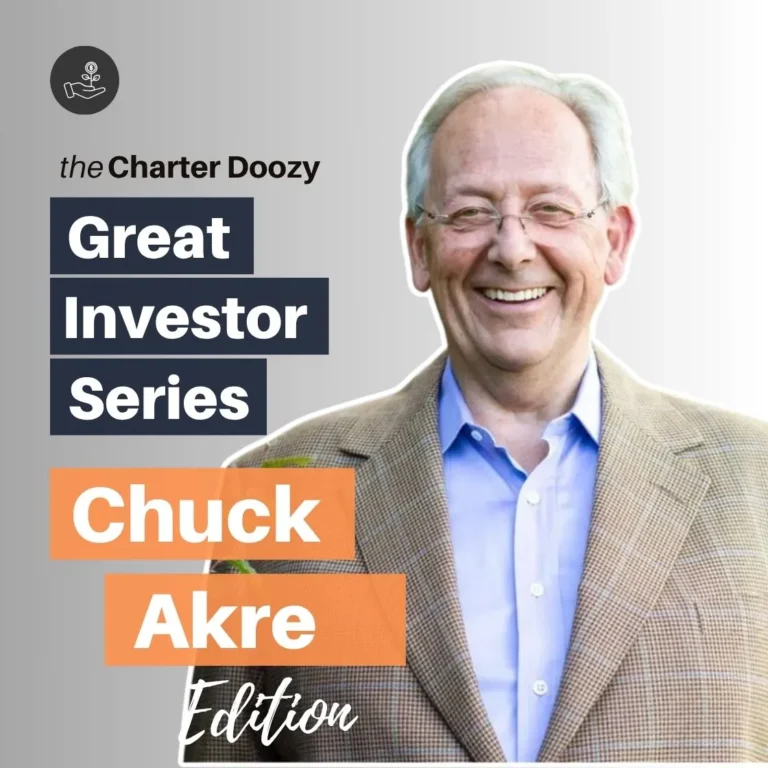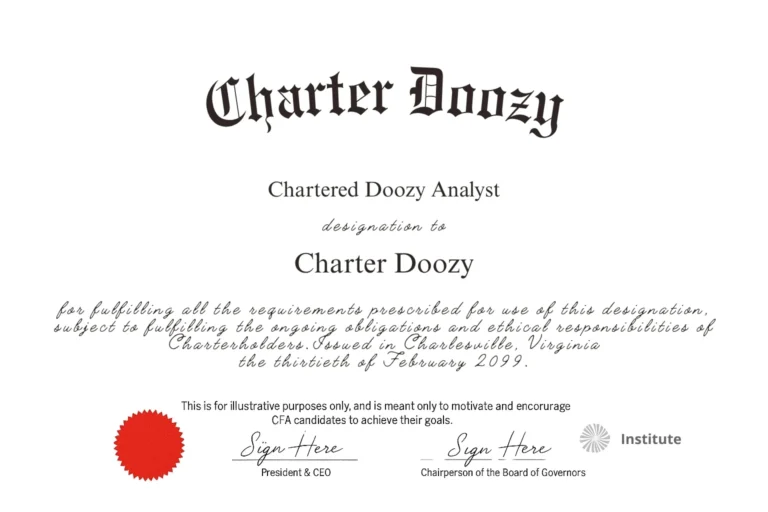⭐ Charles T. “Chuck” Akre – Quick Facts
The Triple-Headed Flywheel and the Relentless Pursuit of Compounding
Some investors talk about compound interest like it’s a neat trick. Chuck Akre treats it like a sacred force of nature.
In countless interviews and letters to shareholders, Akre repeats one core idea in different forms:
“I believe that the path to wealth is owning businesses that compound their value over time.”
It’s a deceptively simple statement. But under Akre’s calm demeanor and gentlemanly southern cadence lies a fiercely disciplined mind obsessed with a single question: what makes certain businesses unstoppable compounding machines?
This obsession led him to identify and invest in firms that produced extraordinary wealth for shareholders—businesses with high returns on invested capital (ROIC), strong competitive moats, and management teams focused on reinvesting profitably. It also earned him a quiet reputation as one of the most consistent compounders in modern investing.
In an era awash with fads, meme stocks, and thematic hype, Akre’s approach stands out for its elegant simplicity—and relentless rigor. His “three-legged stool” is both a philosophy and a practical framework, one that should resonate deeply with any CFA candidate wrestling with valuation, sustainable growth, and capital allocation.
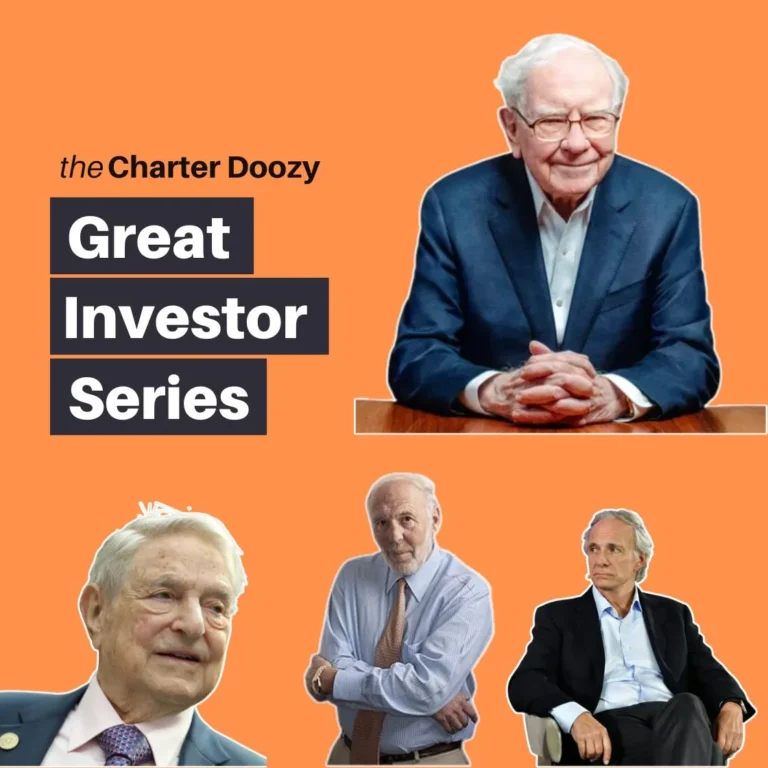
Want to think like the world’s best investors?
Dive into the mindsets, philosophies, and powerful quotes from legends like Soros, Fisher, Dalio, and more. Learn timeless strategies that turn insight into wealth – and transform how you see the markets.
Who Is Chuck Akre?
Chuck Akre was born in 1945 in Virginia, USA. He began his career as a broker with NYSE member firm Johnston, Lemon & Co. in Washington, D.C., where he eventually became Director of Research and a portfolio manager. In 1989, he struck out on his own and founded Akre Capital Management, based in Middleburg, Virginia—a far cry from the glass towers of Wall Street.
Akre’s investing style straddles growth and value in a way that defies neat categorization. He doesn’t hunt for statistically cheap stocks, nor does he chase high-flying narratives without regard to valuation. Instead, he focuses almost monomaniacally on what he calls “compounding machines”—businesses capable of reinvesting capital at high rates of return over long periods.
Though not given a catchy nickname like “Oracle” or “Father of Growth,” Akre is widely revered in investment circles as one of the most astute practitioners of business-focused investing. His Akre Focus Fund has delivered impressive returns, consistently beating the S&P 500 since its inception in 2009, a testament to his long-term discipline and eye for quality.
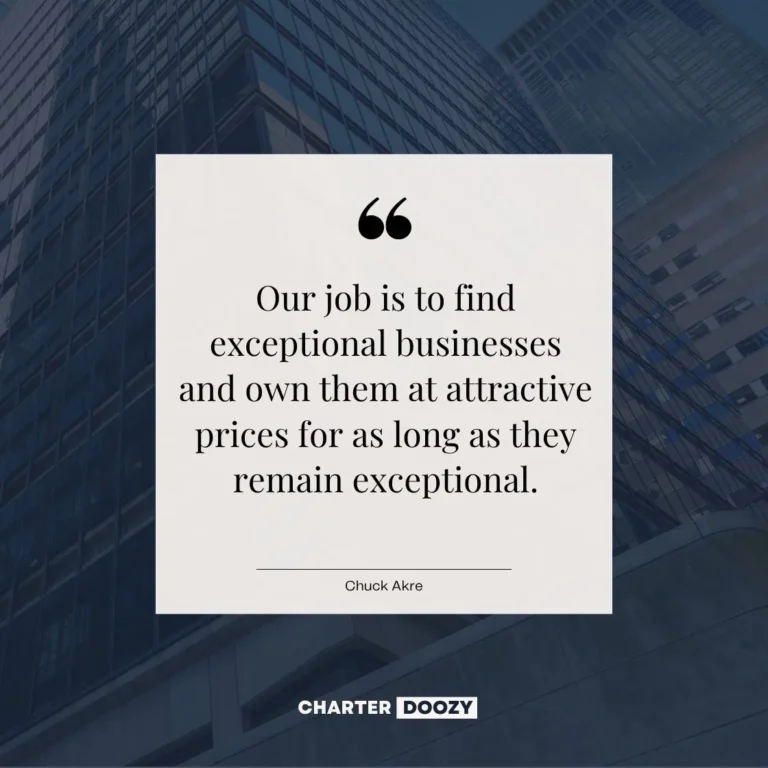
The Core Philosophy: The Three-Legged Stool of Compounding
The Pursuit of the Compounding Machine
Chuck Akre’s entire philosophy revolves around a single mental model: find businesses that can compound capital at high rates over many years. This search is driven by an unrelenting focus on high ROIC, a metric CFA candidates will recognize as a linchpin of valuation analysis, economic profit models, and competitive advantage studies.
In Akre’s words:
“We want to own businesses that earn very high returns on capital, that have very long opportunities to reinvest their excess cash flows at high rates of return, and that are run by honest and skilled managers.”
He visualizes this philosophy as a three-legged stool:
- Exceptional Business Model
The business must possess durable competitive advantages—economic moats—that allow it to generate sustainably high returns on capital. - Reinvestment Runway
The company must have significant opportunities to reinvest incremental capital at similarly high rates. Without this, even a great business becomes a cash cow rather than a compounding machine. - Talented, Shareholder-Aligned Management
The people running the business must be skilled capital allocators, honest, and focused on growing intrinsic value rather than maximizing short-term earnings or share price.
This framework is practically an embodiment of the CFA curriculum’s focus on sustainable competitive advantages, capital budgeting, and corporate governance.
ROIC as the Compass
Unlike investors who obsess over traditional valuation multiples, Akre starts with ROIC. He wants to know not just how much money a business makes—but how efficiently it deploys capital to generate those profits.
This connects directly with readings on Residual Income Models and EVA (Economic Value Added) in the CFA curriculum. A firm earning ROIC far above its cost of capital creates economic profit, which drives intrinsic value upward.
In Akre’s view, high ROIC businesses often look “expensive” on near-term earnings multiples but can be bargains over longer horizons because compounding multiplies value in ways the market often underestimates.
Famous Investments and Illustrative Stories
The Masterclass of Mastercard
Perhaps the most famous example of Akre’s philosophy in action is Mastercard. Akre began investing in Mastercard in the mid-2000s, identifying it as a business with extraordinary economics.
Mastercard earns a small slice of every transaction, yet carries minimal credit risk. The network effects create a formidable moat, while the shift from cash to digital payments offers a vast reinvestment runway.
Mastercard’s ROIC has consistently exceeded 30%, and the business has compounded earnings and free cash flow at double-digit rates for over a decade. Akre’s investment in Mastercard became one of the top holdings in the Akre Focus Fund and contributed significantly to the fund’s outperformance.
This story is a live case study in applying concepts from CFA readings such as Porter’s Five Forces (industry analysis), economic profit valuation, and sustainable growth modeling. It also highlights the importance of qualitative insights alongside quantitative analysis.
The Dollar Tree Success
Another classic Akre holding is Dollar Tree, the discount retail chain. While many investors scoffed at dollar stores as low-quality businesses, Akre recognized Dollar Tree’s superior business model and management discipline.
Dollar Tree’s model generates high inventory turnover and robust cash flow, all while maintaining tight cost controls. Management’s disciplined reinvestment in store growth and optimization enabled the business to expand nationwide while maintaining excellent returns on capital.
Dollar Tree delivered significant returns for Akre, further cementing his reputation for spotting compounding machines hiding in plain sight.
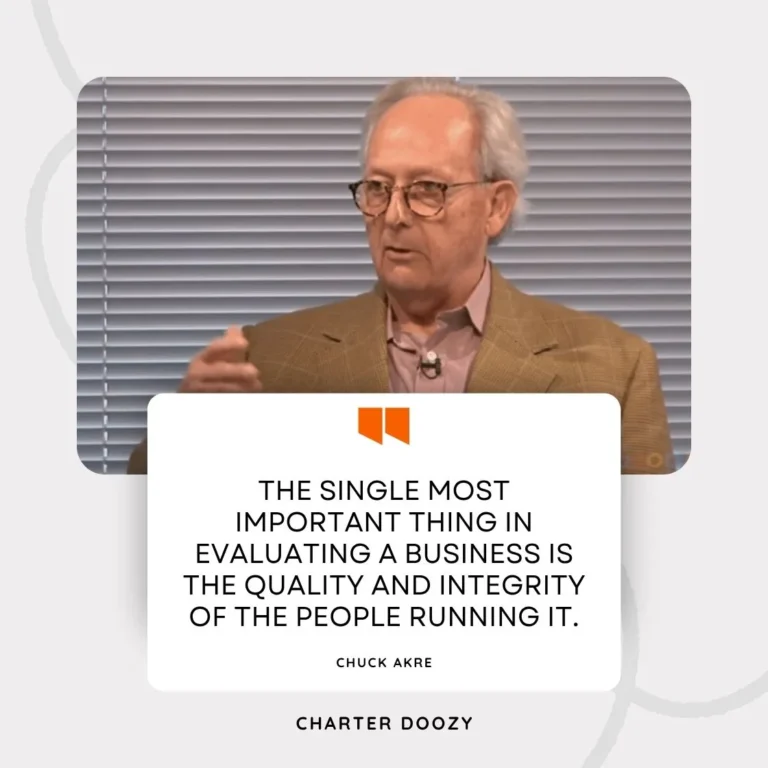
Lessons for CFA Candidates and Professionals
Quality Compounds—But You Need Patience
One of the hardest lessons in investing—and a recurring theme in CFA readings on behavioral finance—is patience. High ROIC businesses often look expensive on a P/E or EV/EBITDA basis. The market, focused on short-term earnings multiples, frequently fails to appreciate how compounding transforms those “expensive” valuations into bargains over time.
Akre’s career is a lesson in resisting the temptation to trade frequently or react to volatility. For CFA candidates, this underscores why intrinsic value calculations should incorporate long-term growth assumptions rather than merely relying on snapshot multiples.
ROIC Over Price Multiples
The CFA curriculum teaches that the value of a business equals the present value of future cash flows. Akre demonstrates that sustainable ROIC is the lifeblood of those cash flows.
Instead of obsessing over short-term valuation metrics, Akre studies the mechanics of value creation. For candidates, this means understanding not just how to calculate ROIC, but why it’s the ultimate driver of intrinsic value.
Capital Allocation Is a Differentiator
One of the most critical—and often underappreciated—lessons Akre offers is the centrality of management’s capital allocation skills. Even a great business can fail to create value if excess cash is squandered on low-return projects or ill-timed acquisitions.
This dovetails beautifully with CFA readings on corporate finance, particularly capital budgeting and agency conflicts. For CFA candidates and professionals alike, Akre’s method is a powerful reminder: it’s not enough to pick good businesses—you must ensure they’re managed by people who deploy capital wisely.
Avoid Complexity, Focus on What Matters
Akre’s writings and interviews are refreshingly free of jargon. He doesn’t talk about delta hedging, exotic derivatives, or macro predictions. Instead, he returns repeatedly to a few core principles.
For CFA candidates drowning in formulas and models, this is a valuable lesson. Mastering the tools is essential, but long-term success comes from applying them to simple, powerful ideas: quality businesses, disciplined reinvestment, and sound management.
Criticisms and Debates
Of course, Akre’s style has its critics. Some argue that paying up for quality businesses increases vulnerability to multiple contraction if growth slows or macro conditions shift.
During speculative booms, high-quality businesses can attract momentum investors, driving valuations into unsustainable territory. Critics point out that even the best compounders can suffer painful drawdowns when expectations reset.
Additionally, Akre’s concentrated approach exposes investors to idiosyncratic risk. While diversification is a staple of the CFA curriculum, Akre’s focused portfolios demonstrate that concentrated bets can deliver outsized returns—but only for those with conviction and discipline.
The broader debate is familiar to every CFA candidate: does it make sense to pay a premium for quality, or should investors demand a margin of safety via low multiples? Akre sits firmly on the side of quality—but insists on reasonable entry prices, illustrating the delicate balance required for success.
Where to Learn More
For those eager to explore Akre’s thinking in greater depth, excellent resources include:
- Akre Capital Management’s letters and commentaries, available on the firm’s website. These writings offer an elegant glimpse into Akre’s thought process and investment discipline.
- Interviews with Chuck Akre on platforms like Value Investing World, GuruFocus, and MOI Global, where he discusses case studies and his “three-legged stool.”
- The book Quality Investing by Lawrence Cunningham, Torkell Eide, and Patrick Hargreaves, which, though not written by Akre, deeply explores principles aligned with his philosophy.
- Podcasts such as The Investors Podcast, which feature fund managers influenced by Akre’s approach.
Keep Compounding: A Final Word
Chuck Akre’s career is a monument to one of the simplest yet most powerful truths in finance: wealth is built over time by compounding capital in quality businesses. His method combines rigorous quantitative analysis with deep qualitative judgment—a marriage CFA candidates should strive to emulate.
In a financial world that often seeks excitement in novelty, Akre reminds us that great investing requires patience, discipline, and a focus on the fundamentals.
So, as you study ROIC calculations, analyze competitive moats, or navigate equity valuation models, remember Akre’s quiet wisdom. Look for the compounding machines. Understand their engines. And give them time to work.
Keep learning. Keep growing. And never underestimate the silent power of compound interest.
